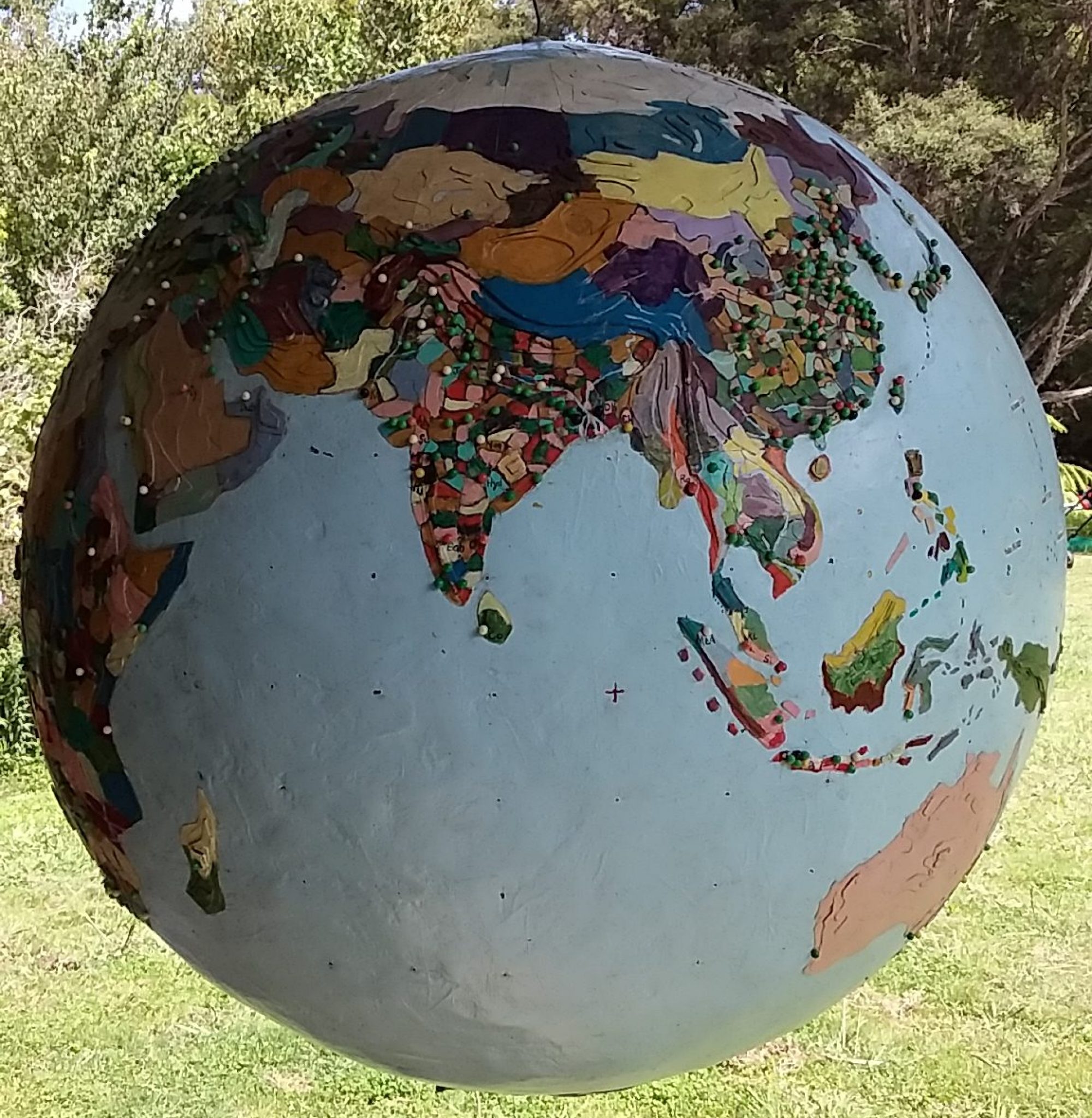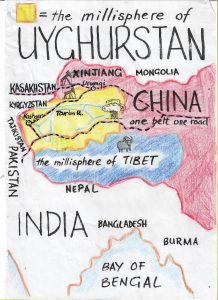Uyghurstan
The millisphere of Uyghurstan is in China’s far western “Xinjiang Uyghur Autonomous Region” (XUAR) which can best be visualised as three millispheres: The city of Urumqi (3.5 million), the Dzungarian Basin to the north of the Tien Shan mountain range and Uyghurstan in the Tarim Basin, south of Tien Shan.
Uyghurstan borders India, Pakistan, Afghanistan, Tajikistan, Kyrgyzstan and Kazakhstan, and sits on the historic Silk Road and China’s millennial One Belt – One Road infrastructure initiative. Because XUAR has one fifth of China’s coal, oil and natural gas reserves, and because the East/West pipeline from Central Asia passes through on its way to Shanghai, Uyghurstan is a very sensitive strategic zone for the People’s Republic of China.
In 1964 XUAR had a population of seven million, twenty years later it had doubled to 14 million and in 2016 it stood at 22 million (roughly 10 million Uighur, 8.5 million Han, 1.5 million Kazakh and 1 million Hui). Much of this population growth came from Han Chinese immigration.
Mao Tse Tung’s brother, Mao Zemin, was executed by a local Han warlord when “East Turkestan” was invaded by the PLA in 1949. At the time three-quarters of the population were Uyghur, now they are a minority and treated as such by the Han invaders. In 2018 somewhere between half and one million Uyghurs are, or have been, detained in “political education camps”
China fears an East Turkestan independence movement fueled by religion and ethnicity. The Uyghurs are Sunni Muslim and speak a Turkic language rather than the Mandarin spoken by the Han. Since 2000 there have been attacks by Uyghurs on Han in XUAR and there is a small Uyghur diaspora living in Turkey. In 2015 attacks on the Chinese embassy in Ankara and their consulate in Istanbul were attributed to Uyghurs and it is estimated that 1500 Uyghurs fought for ISIS in the Middle East.
Faced with Islamic nationalism China engaged with its Central Asian neighbours to the west, and the Regional Anti-Terrorism Structure (RATS) meets regularly to discuss the “three evil forces”: separatism, extremism and terrorism. Chinese “Economic diplomacy” is wielded with loans from the Chinese government funded Asia Infrastructure Investment Bank.
In the new millennium China has been turning XUAN into one of the most surveilled places on earth and Uyghurstan into an open air prison. XUAR Communist Party Secretary, Chen Quanguo arrived in 2016 and in one year had rolled out a network of “convenience police stations” a grid-style social management system pioneered when Chen was Party Secretary in the Tibetan “Autonomous” Region from 2011 to 2016. Grid management was first trialled in Beijing in 2004 – but has its conceptional inception in Disneyland and in policing in LA, USA.
“Convenience police stations” segments urban communities into geometric zones so security staff can monitor all activities with the aid of new technologies. The system relies on big data analytics, connecting a grid of CCTV to the police database to achieve enhanced, automated surveillance. Where you go, who you talk to and what you read online is all monitored. Since 2017 all XUAR citizens are ranked (trustworthy-average-untrustworthy).
New methods of policing include collecting DNA data from the entire population and forcing all phones owners to download an app called “web cleaning soldier” which effectively monitors all phones for illegal social media use like Facebook and WhatsApp. Phones contents are regularly downloaded for monitoring at the pervasive checkpoints.
Iris scanners, facial recognition cameras and ID cards are required at petrol stations, and only the registered owner is allowed to drive a car – monitored by number plate recognition cameras.
Under the “Becoming Kin” program 1.1m (mostly Han) officials are teamed with 1.6m Uyghur families. The “adopted kin” visit or live in, teach mandarin and verify household information. Half of Uighur households have a spy/indoctrinator assigned to them.
The Fanghuiju program of “researching people’s conditions, improving people’s lives and winning people’s hearts,” includes demolition of traditional homes (for health and safety reasons) and shifting Uyghurs into “modern” apartments.
Despite the ban on fasting during Ramadan, headscarves, Islamic names and beards, the demolition of towers and crescents and some neighbourhood mosques Uyghurstan is experiencing a religious revival. The creation of a police state in Uyghurstan by the Chinese Communist Party has lead to mass human rights violations for the Uighurs, and growing resentment.
The capital of Uyghurstan, Kashgar, was until recently a living heritage gem and a legendary stop on the Silk Road. Kashgar has had its soul ripped out in the name of Chinese modernity, and is being turned into a tacky eastern Disneyland for mass Chinese tourism – controlled by a darkly dystopian police surveillance state.

